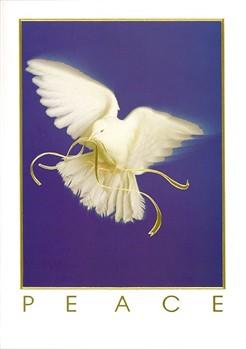I love Peace
By NICHOLAS WOOD NYTVITINA, Kosovo, March 8 — Hajriz Jakupi is not happy.Over the past few weeks Mr. Jakupi, a former guerrillafighter, has been learning the details of a settlementthat most of the ethnic Albanians who dominate Kosovo say should lead to an independent state. That is adream that he and the other Albanians have long been a waiting. It is the quid pro quo that angers him: that therelatively few Serbs living in Kosovo would havecontrol over certain pockets that include a number ofAlbanian villages, one of which is his own, justoutside this town. “It’s an offense,” Mr. Jakupi said, raising his voice.“It is our territory, it is our land,” he said,speaking of the ethnic Albanians who because of theplanned boundaries would become a minority in themunicipality he comes from.How former fighters like Mr. Jakupi behave in the nextweeks and months will be crucial to the success of theplan devised by the United Nations, which would enablethe Albanians to seek recognition as an independentstate. For now, Mr. Jakupi said, he will express hisopposition “in a peaceful manner.”The calculation of the United Nations is that peoplelike Mr. Jakupi and other former fighters in theAlbanian rebel group called the Kosovo Liberation Armywill accept the deal, since it gives the Albanianpopulation considerable independence, though with adose of international supervision. The United Nations hopes to scale back amultibillion- dollar exercise in which it has beenengaged for nearly eight years, tying down thousandsof peacekeeping troops. Its proposals, which havetaken more than a year to prepare, are expected to goto the Security Council for a vote by June. But as planning proceeds, there is also a worry thatthings might go wrong, and not only among people likeMr. Jakupi, who have been quick to fight before. Mr. Jakupi, 35, leads a group of former fighters fromthe Kosovo Liberation Army, which waged an insurgencyagainst Serbian security forces from 1997 to 1999, aconflict that took 10,000 lives and ultimately forcedNATO to intervene. Some of his colleagues were at thecenter of two other insurgencies, in Macedonia andsouthern Serbia, in 2001. Much also depends on Serbia. It is loath to loseKosovo, a province it controlled for most of the 20thcentury and regards as central to its history andidentity. Many Serbs living in Kosovo are weighingwhether to leave. There is also worry that Serbia willsimply hold on to that northern part of Kosovo wherethe Serbs are centered, splitting the province and notrecognizing the new arrangements on the ground. TheUnited Nations and NATO have never been able to exertdominance in that area. That could provoke renewed conflict, top UnitedNations officials and regional experts warn, fromarmed ethnic Albanians determined to retain Kosovo’scurrent boundaries. Another player in addressing the issue is Russia,which has hinted that it might veto the settlement inthe Security Council. “If independence is not recognized, I think peoplewill take up arms,” Mr. Jakupi said. “It is theminimum we can accept. This is what our heroes gavetheir lives for in the war.”Even if things go well, international and localofficials say, ethnic divisions will not allow thequick exit of peacekeepers and administrators thatother countries involved in the planning hope for. Europe and the United States will need to play therole of arbitrator in the divided and economicallybackward region for years, according to this view,having some oversight over the new government and anability to amend laws and remove public officials. Kosovo has been run by the United Nations since June1999, after a 78-day NATO-led bombing campaign forcedout the Serbian security forces accused of atrocitiesagainst ethnic Albanians.Years later there is little doubt among United Nationsofficials that their time here should come to an end,allowing the European Union to take the lead, thoughwith responsibilities much reduced from those theUnited Nations had and with most decision-makingpowers in the hands of the Albanian-led government.Ethnic Albanians are increasingly impatient to controltheir own affairs and have taken their anger outagainst the United Nations. There are frequentprotests against the United Nations in Pristina, theregional capital, most recently on Saturday, whenseveral thousand people marched past the UnitedNations headquarters shouting, “U.N. out.” Under proposals by the United Nations’ chiefnegotiator for Kosovo, Martti Ahtisaari, the UnitedNations would be replaced by a European Union-ledmission with limited but real powers, but Kosovo wouldrun considerable operations on its own. Controls would be put in place to protect minorities.Serbian areas would control their own affairs inhealth and education in five new municipalities, withsome funds from the Serbian government. The EuropeanCommission has allocated 120 million euros (about $158million) over three years to help the minoritycommunities adjust. For the Serbs, “this is attractive, if they engage,”said Torbjorn Sohlstrom, the European Union officialin charge of planning for the next administration.But Serbia’s record of engagement in Kosovo suggeststhat ordinary Serbs may not interact with the newgovernment as much as European officials might wish. For six years Serbia has been putting pressure onSerbs living in Kosovo to keep them from cooperatingwith international or Albanian institutions here,threatening to dock the pay of government workers liketeachers or hospital workers or to cut off theirpensions.Serbia’s prime minister, Vojislav Kostunica, anationalist, has said his government will neverrecognize an independent Kosovo. “It will be very hard to implement if the Serbiangovernment is against it,” said Oliver Ivanovic, oneof a handful of Serbian politicians who take part inethnic-Albanian- dominated institutions in Kosovo. Others are also worried that things not will proceedby the book, most notably in the Serbian-dominatednorth of Kosovo.“Here we are just a few months from settlement day andwe don’t know how or what to do,” said Kim Vetting, anadviser with the Organization for Security andCooperation in Europe. “How do we maintain controlthere? Nobody is coming up with any answer.”
11 March 2007
Subscribe to:
Post Comments (Atom)

No comments:
Post a Comment